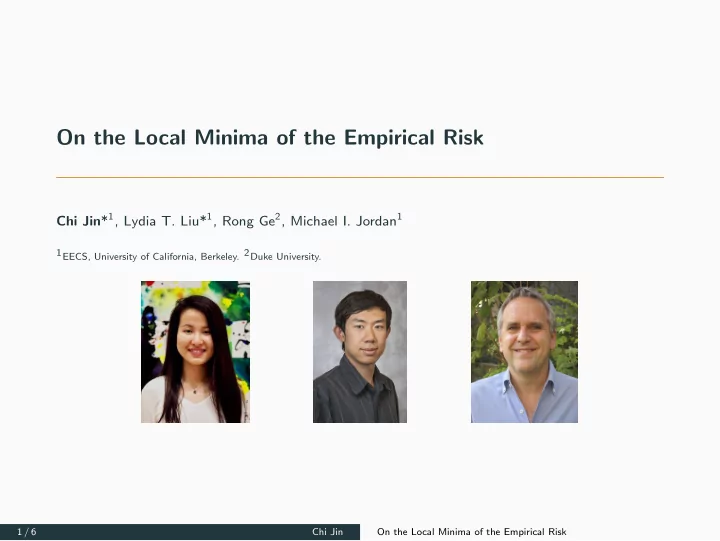

On the Local Minima of the Empirical Risk Chi Jin * 1 , Lydia T. Liu* 1 , Rong Ge 2 , Michael I. Jordan 1 1EECS, University of California, Berkeley. 2Duke University. 1 / 6 Chi Jin On the Local Minima of the Empirical Risk
Overview Nonconvex Optimization. ◮ Gradient Descent (GD) → stationary points : local max, saddle points, local min. 2 / 6 Chi Jin On the Local Minima of the Empirical Risk
Overview Nonconvex Optimization. ◮ Gradient Descent (GD) → stationary points : local max, saddle points, local min. ◮ Perturbed GD [ Jin et al. 2017] efficiently escapes local max and saddle points. 2 / 6 Chi Jin On the Local Minima of the Empirical Risk
Overview Nonconvex Optimization. ◮ Gradient Descent (GD) → stationary points : local max, saddle points, local min. ◮ Perturbed GD [ Jin et al. 2017] efficiently escapes local max and saddle points. ◮ How to deal with spurious local min? 2 / 6 Chi Jin On the Local Minima of the Empirical Risk
Local Minima In general, finding global minima is NP-hard . 3 / 6 Chi Jin On the Local Minima of the Empirical Risk
Local Minima In general, finding global minima is NP-hard . f Avoiding “shallow” local minima Goal: finds approximate local minima of smooth nonconvex function F , given only access to an errorneous version f where sup x | F ( x ) − f ( x ) | ≤ ν 3 / 6 Chi Jin On the Local Minima of the Empirical Risk
Application Statistical Learning. Minimize population risk R while only have access to emprical risk ˆ R n . n R n ( θ ) = 1 ˆ � R ( θ ) = E z ∼D [ L ( θ ; z )] , L ( θ ; z i ) . n i =1 4 / 6 Chi Jin On the Local Minima of the Empirical Risk
Application Statistical Learning. Minimize population risk R while only have access to emprical risk ˆ R n . n R n ( θ ) = 1 ˆ � R ( θ ) = E z ∼D [ L ( θ ; z )] , L ( θ ; z i ) . n i =1 R n ( θ ) | ≤ O (1 / √ n ). Unifrom convergence guarantees sup θ | R ( θ ) − ˆ 4 / 6 Chi Jin On the Local Minima of the Empirical Risk
Results f Goal: find ǫ -approximate local minima of F in polynomial time. Central Questions: 1. What algorithm can achieve this ? 2. How much error ν can be tolerated ? 5 / 6 Chi Jin On the Local Minima of the Empirical Risk
Results f Goal: find ǫ -approximate local minima of F in polynomial time. Central Questions: 1. What algorithm can achieve this ? 2. How much error ν can be tolerated ? Zhang et al. [2017]: Stochastic Gradient Langevin Dynamics (SGLD) if ν ≤ ǫ 2 / d 8 . 5 / 6 Chi Jin On the Local Minima of the Empirical Risk
Results f Goal: find ǫ -approximate local minima of F in polynomial time. Central Questions: 1. What algorithm can achieve this ? 2. How much error ν can be tolerated ? Zhang et al. [2017]: Stochastic Gradient Langevin Dynamics (SGLD) if ν ≤ ǫ 2 / d 8 . This Work: Perturbed SGD on a “smoothed” version of f if ν ≤ ǫ 1 . 5 / d . 5 / 6 Chi Jin On the Local Minima of the Empirical Risk
Almost Sharp Guarantees Is there better polynomial time algorithms that tolerate larger error? 6 / 6 Chi Jin On the Local Minima of the Empirical Risk
Almost Sharp Guarantees Is there better polynomial time algorithms that tolerate larger error? No! Complete characterization of error ν vs accuracy ǫ and dimension d . 6 / 6 Chi Jin On the Local Minima of the Empirical Risk
Almost Sharp Guarantees Is there better polynomial time algorithms that tolerate larger error? No! Complete characterization of error ν vs accuracy ǫ and dimension d . Poster: Wed 5-7 PM, #43. Thanks! 6 / 6 Chi Jin On the Local Minima of the Empirical Risk
Recommend
More recommend